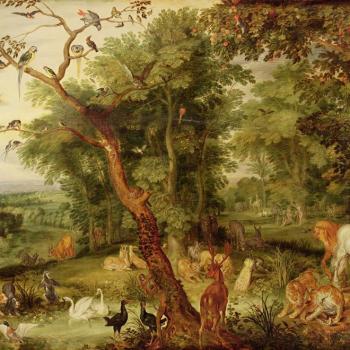Lectionary Reflections: Year A
Sixth Sunday of Easter
May 29, 2011
Psalm 66:8-20
Frankly, it is quite absurd to leave out the first seven verses of this psalm, as the lectionary does. Quite simply, not reading the whole psalm turns the poem into a different one, distorting the intent of the whole. This is a collective psalm of thanksgiving, as verses 1-7 make plain; the singular worshipper who speaks in verses 13 and following is a member of the community who is thanking God for God's rescue. Such a truncation reinforces a very dangerous and pervasive problem in 21st-century Christian belief and practice, namely the conviction that religious devotion is finally only individual, divorced from the community of praise. We do not need any more reminders that we have all too often become a worshipping community of ones.
This stark individualism has numerous ramifications for our lives as believers. We imagine ourselves "spiritual" but not "religious," that familiar nostrum that appears to mean something like the following: "I feel something all tingly in me whenever I gaze at a mountain, or tread the holy golf course, or sit of a pleasant Sunday, reading my paper. Church is just dull." Indeed, we prefer to "bowl alone," as the popular book has it, or in our language, "pray alone." But Psalm 66, and other thanksgiving psalms like it, will have none of it.
Finally, only praying alone can lead to weak praise, to a refusal to make public one's conviction that without the presence and power of God life becomes unlivable or at the very least far less rich than it could be. One can of course "make a joyful noise to God" on one's sun-splashed patio, but how much less grandeur may be found there than in the assembly of people who "make a joyful noise" with "all the earth," singing "the glory of God's name," giving to God "glorious praise" (v. 1). "All the earth worships you," claims the poet (v. 4), and my refusal to join in the chorus, preferring my mostly silent solo, robs the choir of my voice and robs me of the joy of communal praise.
And I lose something else of great value. I forget the very reason for praise in the first place. God is not to be praised merely because God has rescued me from my troubles, however difficult and painful I experienced them to be. No, God is in the very business of rescue and has been doing it from the foundation of the world. "God turned the sea into dry land; they passed through the river on foot" (v. 6). Here we hear once again the central claim of Israel's belief in their God. In Genesis 1, God divided the waters "so that the dry land could appear," and so that we might have a place to live. In Exodus 14 God divided the waters of the Sea of Reeds so that the dry land could appear, and so that the Israelites might find their freedom. In Joshua 3:14-17 again God divides the water so that the priests may carry the Ark of the Covenant into the land of promise, and so that the people of Israel may enter that land on dry ground. God, it turns out, is a grand hydrologist, moving the waters in such a way that a way is made for God's people.
If I stay away from the worshipping assembly, I too easily forget that God's rescue is not just for me; God's rescue is for all who cry out in praise. It is "we" who have been rescued (vs. 8-12). Only after I can celebrate with all my brothers and sisters "our" victories, can I then turn to my own sense of salvation. But even then I cannot only keep my praise to myself. Witness what the individual worshipper does in verses 13-20.
First, she comes into the place of worship (not into her own parlor!) and brings appropriate sacrifice, in her case "burnt-offerings and vows" (v. 13). One need not be put off by the antiquated notion of squealing animals to understand the point; though I can of course worship God anywhere, the house of worship is the best place to perform the worshipping act since that is precisely why the place was constructed.
But after she has brought her sacrifice, she does not then leave the building, lock up the animal trailer, hop in her car, and ride silently home. She rather shouts out "come and hear, all you who fear (worship) God, and I will tell you what God has done for me" (v. 16). She announces in the community of faith that "truly God has listened, has given heed to the words of my prayer" (v. 19).
I am not urging us to attend to public worship merely because my wife and I are or have been pastors of churches. What Psalm 66 calls for is not merely self-serving on the part of religious professionals who need bodies in the pews to survive. We all need the support, the faith, and the voices of others to help us offer our richest praise to God. And the others need my voice, my experience, my convictions to fill out the community of praise. Indeed, all of us need at least a weekly reminder that the God we praise is the rescuing God, who has always been in the business of pushing water out of our way, creating dry land, on which we may live and flourish and praise.
And may our communal prayers always end with something like the grand words that close Psalm 66: "Blessed be God, who has not rejected my (our) prayer, nor has removed unbreakable love from me (us)."
5/22/2011 4:00:00 AM





